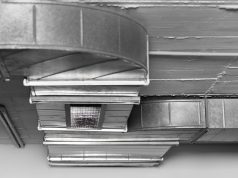
When deciding to upgrade their living space, homeowners often find themselves at a crossroads between opting for a knock-down rebuild or going through the renovation process.
While both paths can lead to the home of your dreams, they do so in very different ways. Let’s figure out each of their benefits and challenges, as well as key considerations that might influence your decision.
Knock-Down Rebuild
A knock-down rebuild involves removing an existing building to make space for new construction on the same land. This process allows for a start from scratch, enabling the homeowner to tailor the new home to their exact needs and desires.
This method’s main advantage is its freedom in design, layout, and material choice. This ensures that everything from the foundation to the rooftop can be modern, energy-efficient, and fully customised to the homeowner’s lifestyle.
A notable trend in knock-down rebuilds is the growing emphasis on eco-friendly and smart home designs. Homeowners are increasingly interested in incorporating sustainable building materials, solar panels, and advanced home automation systems to create aesthetically pleasing, environmentally conscious, and technologically advanced spaces.
The price of undertaking a knock-down rebuild project can be substantial. The costs involve demolishing the old structure and constructing the new home, which can be higher than renovating an existing property.
These projects face challenges such as obtaining necessary permits, managing construction delays, and sometimes, needing temporary relocation during the building process. Moreover, figuring out local zoning laws and making sure everything is up to code can be tricky without the right know-how.
Comprehensive planning, budgeting for unforeseen expenses, and engaging with reputable professionals are possible solutions to mitigate these challenges. Experienced architects, builders, and project managers can provide valuable guidance and support throughout the process, ensuring the project stays on track and within budget.
Renovation
Renovation involves making improvements, repairs, or alterations to an existing structure to enhance its appearance, functionality, or efficiency. This option allows homeowners to update their living spaces without the need for complete demolition, preserving the character and charm of the original building.
The benefits of renovation include cost-effectiveness, the potential to increase property value, and the opportunity to customise the living space while maintaining its original identity. It also allows for more flexibility in project timing, meaning you can tackle the work in stages as your budget allows.
The trend in renovations leans towards energy efficiency and modernisation. Homeowners focus on updating their homes with energy-saving appliances, better insulation, and modern decor, aiming to combine style with sustainability and comfort.
The price of a renovation can vary significantly, depending on the scope and complexity of the project. Minor updates may require a modest investment, while major structural changes or additions can be more costly.
Renovations can present challenges, including discovering unexpected issues once the work begins and the potential for projects to exceed the budget and timeline. It may also require living in a construction zone or finding temporary accommodations, which can add stress and inconvenience to daily life.
Like knock-down rebuild, possible solutions to mitigate these challenges include a well-thought-out plan and a flexible budget with a contingency fund for unforeseen expenses. Hiring a reliable contractor with a proven track record can also mitigate risks. Furthermore, clear communication about your living situation and setting realistic timelines can help manage the stress and disruption, ensuring a smoother renovation experience.
Key Comparison
The main differences between a knock-down rebuild and renovation lie in the scope of work, cost, and impact on the existing structure. A knock-down rebuild offers a fresh start with limitless design possibilities but comes at a higher cost and requires navigating more complex processes.
Renovation, on the other hand, is typically less expensive and allows for incremental improvements that preserve the home’s original character. However, the existing architecture and structural constraints may limit the renovation.
Do I Need Professional Guidance?
While due diligence is critical in preparing for either a knock-down rebuild or a renovation project, the complexity and scope of these undertakings often necessitate professional guidance.
Whether you’re drawing up plans for a brand-new home or navigating the intricacies of renovating an existing structure, the expertise of architects, builders, and project managers can be invaluable. These professionals can offer insights into cost-saving strategies, regulatory compliance, and innovative design solutions that might not be apparent to the average homeowner.
Moreover, they can help avoid costly mistakes, ensure the project proceeds smoothly, adhere to budgets, and meet timelines. If you’re unsure about any aspect of your project, seeking professional help can provide peace of mind and ensure that your investment results in the home you envision without unnecessary expense or delay.
Final Thoughts
Deciding between a knock-down rebuild and renovation requires careful consideration of one’s needs, budget, and long-term goals. Homeowners should conduct thorough due diligence, exploring all aspects of their project, including legal, architectural, and financial considerations. Again, seeking professional advice is highly recommended to ensure the project is executed smoothly, efficiently, within budget, and with the desired outcome.













